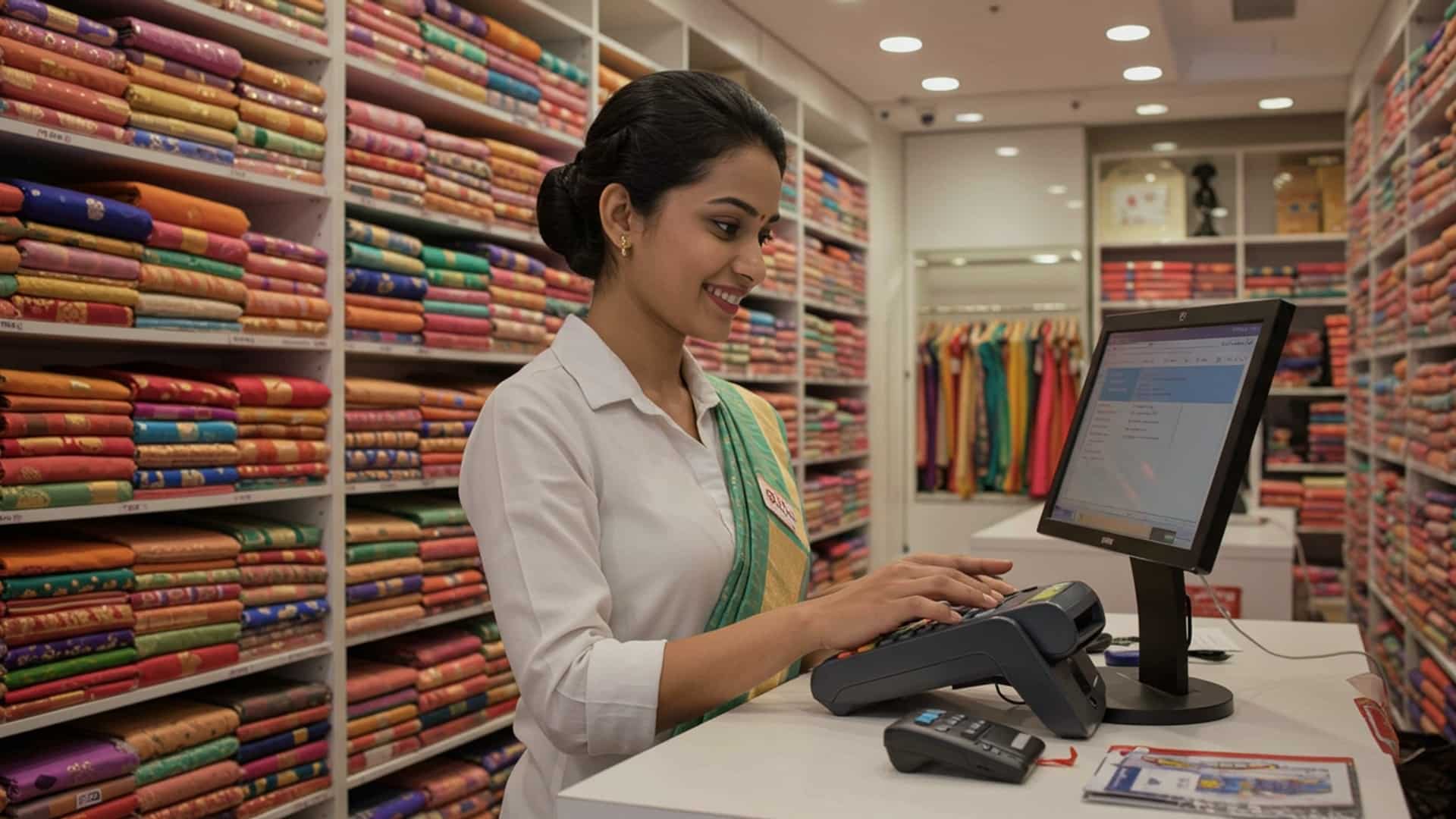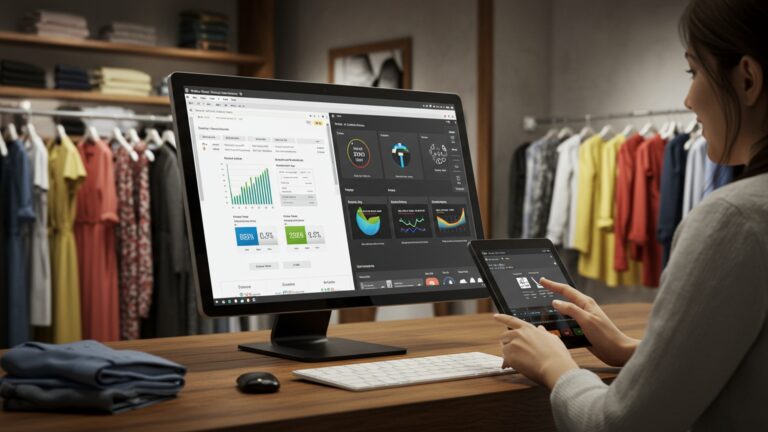Learn 7 Smart Ways a POS System Boosts Saree Shop Sales
In the vibrant, intricate world of saree retail, where each drape tells a story and inventory can span thousands of unique designs, traditional sales methods often struggle to keep pace with modern customer expectations. Gone are the days of manually tracking exquisite Banarasi silks or elusive Kanjeevaram weaves; a cutting-edge pos system for saree shop is now the cornerstone of operational excellence and accelerated growth. Imagine seamlessly managing inventory with real-time updates, personalizing customer experiences by recalling past preferences for specific fabrics or embroidery. leveraging AI-powered insights to predict demand for trending styles. This technological shift, from archaic ledgers to integrated digital platforms, not only streamlines checkouts and minimizes stock discrepancies but also empowers shops to craft highly targeted marketing campaigns, ultimately transforming foot traffic into loyal clientele and significantly boosting sales.

Understanding the Power of a POS System for Your Saree Shop
A Point of Sale (POS) system is far more than just a cash register; it’s a comprehensive software and hardware solution designed to manage sales transactions, track inventory. streamline various business operations. For a saree shop, where inventory can be vast and customer interactions often personalized, a robust POS system acts as the central nervous system, integrating sales, inventory, customer data. reporting into one cohesive platform. Imagine a digital assistant that helps you manage every intricate detail, from the unique weaves of Banarasi silks to the delicate embroidery on a designer georgette, ensuring efficiency and accuracy at every step. This foundational technology is revolutionizing how saree businesses operate, making them more competitive and customer-centric.
1. Streamlined Inventory Management: The Heart of Your Saree Business
Managing a diverse inventory of sarees—categorized by fabric, weave, design, color, price range. occasion—can be incredibly complex. A sophisticated POS system for saree shop environments transforms this challenge into a core strength.
- Real-time Tracking: Every saree that enters or leaves your store is recorded instantly. This means you always know exactly what you have in stock, preventing the frustration of telling a customer a popular saree is available, only to find it’s sold out.
- Automated Reordering: Based on sales data and pre-set thresholds, the system can alert you when certain saree types or designs are running low, or even generate purchase orders automatically. This ensures you never miss out on sales due to stockouts of best-selling items, especially during festive seasons like Diwali or wedding rushes.
- Identifying Fast and Slow Movers: Detailed reports highlight which sarees are flying off the shelves and which are gathering dust. This insight is invaluable for making smart purchasing decisions, optimizing your capital. planning seasonal collections. For example, a shop owner using a POS system might discover that while expensive Kanjivarams sell well during wedding season, simpler cotton blends are consistent sellers throughout the year, prompting adjustments to their buying strategy.
Consider a scenario where a shop owner previously relied on manual ledgers. They might accidentally overstock on a trendy but short-lived design, tying up significant capital, or worse, run out of a classic, high-demand item during peak season. A POS system mitigates these risks, ensuring a healthy inventory turnover.
2. Enhanced Customer Experience Through Personalization
Saree shopping is often an emotional and highly personalized experience. A POS system empowers your staff to deliver exceptional, tailored service that builds lasting customer loyalty.
- Comprehensive Customer Profiles: A good POS system allows you to create detailed customer profiles, including purchase history, preferred styles, colors, sizes, special occasions (like anniversaries or upcoming family weddings). even notes on their preferences (e. g. , “prefers handloom over machine-made”).
- Personalized Recommendations: When a returning customer walks in, your sales associate can quickly access their profile. Imagine knowing a customer bought a heavy silk saree last year for her daughter’s wedding and now she’s looking for something for her niece. The associate can instantly suggest relevant options, demonstrating that you comprehend her needs. This level of personalized service is a significant differentiator.
- Targeted Promotions and Loyalty Programs: Based on purchase history, you can segment customers and send targeted promotions. A customer who frequently buys cotton sarees might receive an SMS about a new summer collection, while someone who purchased bridal wear could get a special offer on matching accessories. Loyalty points tracked by the POS system can also reward repeat business, encouraging customers to return to your saree shop.
A recent study by Accenture revealed that 91% of consumers are more likely to shop with brands that provide relevant offers and recommendations. A POS system for saree shop operations directly facilitates this by making customer data actionable.
3. Faster and More Accurate Checkout Processes
Long queues and slow checkouts can quickly diminish a positive shopping experience, especially during peak sales periods. A modern POS system dramatically speeds up and refines the sales transaction process.
- Barcode Scanning: Instead of manually entering product codes or prices, scanning a barcode instantly retrieves all saree details and pricing, virtually eliminating human error.
- Integrated Payment Processing: Seamless integration with various payment gateways (credit cards, debit cards, UPI, mobile wallets) means faster transaction completion and less reconciliation work.
- Digital Receipts: Offering customers the option for email or SMS receipts not only saves paper but also provides a convenient record for them and an opportunity for you to capture their contact data for future marketing efforts.
Consider a busy festive weekend. With a traditional setup, customers might wait several minutes, growing impatient. With a modern POS system, transactions are completed in seconds, ensuring a smooth exit and a higher rate of customer satisfaction. This efficiency also frees up staff to assist more customers on the sales floor.
4. Data-Driven Decision Making and Strategic Growth
One of the most powerful aspects of a POS system for saree shop owners is its ability to generate comprehensive reports and analytics, transforming raw sales data into actionable insights.
- Detailed Sales Reports: Access daily, weekly, monthly. yearly sales reports, broken down by product, category, staff member. even time of day. This allows you to identify peak selling periods, comprehend sales trends. optimize staffing.
- Product Performance Analysis: Pinpoint exactly which saree designs, fabrics, or collections are most profitable and which are underperforming. This insight is critical for making informed decisions about future inventory purchases and marketing campaigns.
- Customer Behavior Insights: comprehend purchasing patterns, average transaction values. the effectiveness of promotions. For instance, you might discover that customers who buy high-end silk sarees often return within six months for accessories, prompting you to cross-sell more effectively.
Here’s a simplified example of how sales data can inform decisions:
| Report Type | Key Insight | Actionable Decision |
|---|---|---|
| Monthly Sales by Category | “Kanjeevaram Silks” category revenue up 25% year-on-year. | Increase stock of popular Kanjeevaram designs, allocate more marketing budget to this category. |
| Sales by Day/Time | Highest sales recorded on Saturdays between 4 PM – 7 PM. | Ensure maximum staff presence during these hours, schedule promotions. |
| Product Performance | Specific “Georgette Floral” design has low sales volume for 3 months. | Consider a discount, bundle offer, or discontinue the design in future orders. |
This empirical data removes guesswork, allowing you to refine your business strategy with confidence.
5. Effective Employee Management and Performance Tracking
Your sales team is critical to your saree shop’s success. A POS system provides tools to manage and motivate your staff effectively.
- Individual Sales Tracking: Monitor each employee’s sales performance, average transaction value. customer interactions. This data is invaluable for identifying top performers and areas where additional training might be needed.
- Commission Calculations: If your sales team works on commission, the POS system can automate these calculations accurately, saving significant administrative time and ensuring fair compensation.
- Time Clock Features: Many POS systems include built-in time clock functionality, streamlining payroll processes and ensuring accurate tracking of employee work hours.
Imagine being able to show a sales associate concrete data on their saree sales, highlighting their strengths and helping them set targets. This transparency fosters a more motivated and productive team, leading to higher overall sales. According to Gallup, companies with highly engaged employees outperform their competitors by 147% in earnings per share.
6. Seamless Omnichannel Sales Integration
In today’s retail landscape, customers often interact with businesses across multiple channels—online, in-store, social media. An advanced POS system facilitates a seamless omnichannel experience for your saree shop.
- Synchronized Inventory: The most significant benefit is real-time inventory synchronization between your physical store and your e-commerce website. If a saree sells in-store, it’s immediately updated online, preventing frustrating situations where a customer buys an item online that is no longer available.
- Click-and-Collect Options: Customers can browse and purchase sarees online and then pick them up in your physical store. The POS system manages these orders, notifying staff and ensuring a smooth handover.
- Unified Customer Experience: Whether a customer interacts with your brand online or in person, their purchase history, preferences. loyalty points are all accessible through the central POS system. This means consistent service, regardless of the channel.
For a saree shop that also operates an online store, a POS system for saree shop with robust omnichannel capabilities is essential. It extends your reach beyond geographical boundaries while maintaining a cohesive brand experience. This integration ensures that your online customers have the same access to your beautiful collections as your walk-in patrons.
7. Robust Security and Loss Prevention
Protecting your valuable saree inventory and sensitive customer data is paramount. A comprehensive POS system offers multiple layers of security.
- User Permissions: You can assign different levels of access to staff members. For example, junior staff might only be able to process sales, while managers have access to inventory adjustments and financial reports. This reduces the risk of internal theft or unauthorized actions.
- Detailed Transaction Logs: Every sale, return, discount. inventory adjustment is meticulously recorded with a timestamp and associated staff member. This audit trail makes it easy to investigate discrepancies.
- CCTV Integration: Some advanced POS systems can integrate with security cameras, allowing you to link specific transactions with video footage, which is a powerful deterrent against theft.
- Inventory Audits: Regular inventory counts, often facilitated by the POS system’s reporting features, help identify shrinkage (loss due to theft, damage, or administrative errors) quickly, allowing you to address issues proactively.
For a saree shop dealing with high-value items, the security features of a modern POS system are indispensable. It not only safeguards your assets but also ensures the integrity of your sales data and customer insights, building trust and protecting your business’s reputation.
Conclusion
Embracing a modern POS system is no longer a luxury for saree shops; it’s a strategic imperative. We’ve explored how these smart tools streamline everything from intricate inventory management of unique silk weaves to cultivating loyal patrons through personalized offers. My personal tip for any saree shop owner is to not just install a system. to truly engage with its analytics. For instance, understanding which specific regional sarees sell best during local festivals, a insight easily gleaned from POS data, allows you to optimize stock and marketing efforts, transforming seasonal rushes into predictable profits. The current trend towards cloud-based and mobile POS solutions further empowers businesses, enabling pop-up stalls at wedding exhibitions or home-based designers to manage sales with the same efficiency as a storefront. This flexibility, coupled with real-time sales reporting and automated GST invoicing – a recent development making compliance simpler – means you spend less time on paperwork and more time curating beautiful collections. Investing in the right POS is an investment in your legacy, ensuring your cherished saree business not only survives but thrives brilliantly in today’s dynamic market.
More Articles
5 Best POS Features Guide for Ethnic Wear Stores to Boost Sales
7 Essential Features Guide for Clothing Store POS Software India
How to Choose the Best Android POS Software for Your Business
How to Easily Set Up and Use Mobile POS Software for Seamless Sales
Learn How to Choose the Right POS Software for Efficient Retail Operations
FAQs
How can a POS system actually help my saree shop sell more?
A POS system streamlines your operations, from managing inventory to speeding up checkout. By giving you clear insights into what’s selling well and who your best customers are, it helps you make smarter decisions, offer better service. ultimately boost your sales.
Keeping track of so many unique sarees sounds like a nightmare. How does a POS system simplify inventory?
It’s a game-changer! A POS system provides real-time inventory tracking. You’ll know exactly which sarees are in stock, what designs are popular. when it’s time to reorder. This prevents lost sales from stockouts and avoids overstocking slow-moving items, ensuring you always have what your customers want.
What about making customers happier and more likely to return?
Absolutely! A POS system enhances the customer experience significantly. It enables faster checkouts, reduces waiting times. can even help you create personalized recommendations based on past purchases. You can also easily manage loyalty programs and special discounts, making customers feel valued and encouraging repeat visits.
Can a POS system really tell me which saree designs are selling best?
Yes, definitely! One of the biggest advantages is its robust reporting features. You’ll get detailed sales analytics showing which saree types, colors, or price points are top performers. This data is invaluable for planning future purchases and marketing efforts, ensuring you stock more of what’s in demand.
Will a POS system save me time and reduce errors in my daily operations?
It certainly will. By automating tasks like sales calculations, price lookups. inventory updates, a POS system drastically cuts down on manual work and human error. This means more accurate transactions, less time spent on administrative tasks. more time available to assist your customers.
How does a POS make it easier to run sales or special offers on sarees?
It makes promotions a breeze! You can easily set up and apply various discounts, bundle offers, or loyalty point schemes directly through the system. It automatically calculates the new totals and tracks the success of each promotion, helping you grasp what works best for your saree shop.
Is a POS system complicated to use for a traditional saree business like mine?
While there’s a small learning curve, modern POS systems are designed to be intuitive and user-friendly, even for businesses that have traditionally operated manually. The long-term benefits in efficiency, sales insights. customer satisfaction far outweigh the initial adjustment, making it a smart investment for any saree shop looking to grow.





